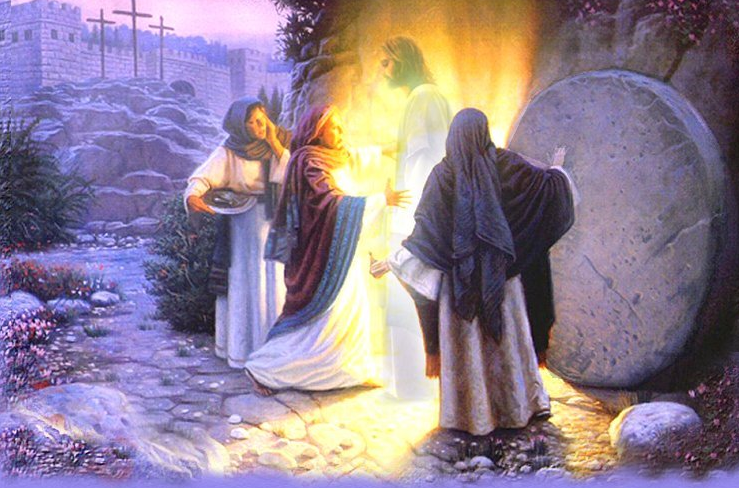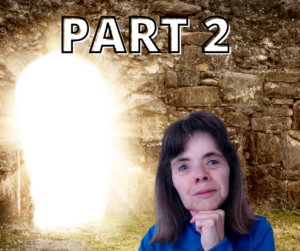I
have argued that we have good reasons to believe the Old Testament is
inspired and true given what Jesus said about himself, and that He
proved those claims by rising from the dead. God would never raise a
blasphemer and a heretic, which is exactly what Jesus would be if his
claims were false. If Jesus rose from the dead, then that’s like God
putting His stamp of approval on everything Jesus said and did.
I
believe in angels and demons. Why? Because Jesus taught that they
existed and He rose from the dead. I believe in Heaven and Hell? Why?
Because Jesus taught that people were going to one of those two places
after we die. I believe the Exodus happened. Why? Again, Jesus taught
that it happened. The self-understanding of Jesus and the Resurrection
can indirectly justify so many Christian beliefs evidentially. It’s yet
another reason why its so pivotal. God would not raise a heretic and
blasphemer. He would not give new life to a wretched, unrepentant
sinner. Since Christ rose, we can have confidence that He wasn’t a
blasphemer or a heretic when He claimed to be God, and we also can have
confidence in other things He taught as truth (e.g the existence of
angels, demons, Heaven, Hell, and some Old Testament events).
This is where the debate comes to at this point. Did Jesus think He was God? And also, did He rise from the dead? If you want to look at the historical evidence I provide for the resurrection of Jesus, click on these highlighted letters and it will take you to a post I wrote near Easter where I provide evidence for Jesus’ empty tomb, his postmortem appearances and the fact that his disciples sincerely believed He rose from the dead despite having every reason not to, given Jewish presuppositions about the Messiah at the time. If you’d light to look at the evidence for the historical evidence for Jesus’ resurrection and also a lengthy treatment of naturalistic theories atheists and other non-Christians have come up with to make the evidence fit within their worldview, click on these highlighted letters instead.
But was it really God who raised Jesus from the dead? An atheist once argued on the internet that even if we conceded that Jesus rose from the dead, that we couldn’t know it was God who raised Jesus, and therefore not know if Jesus’ claims and teachings really were vindicated. He said
—————————————————–
“Assume, for the sake of argument, the following two propositions:
1. Jesus appeared to have risen from the dead;
2. Demons exist.
We are left with questions like the following:
— How do you know that demons didn’t cause Jesus to rise from the dead?
— How do you know that Jesus wasn’t just a demon who appeared to rise from the dead but never actually died?”
—————————————————
That last question is pretty easy to answer, so I’ll save treatment of it for last. I’ll take on the first question, since it’s a little harder to answer.
*“How do you know that demons didn’t cause Jesus to rise from the dead?”
Ok, so how do we know it was God who raised Jesus from the dead and not
some other spirit being? Well, I could simply say that we have no
evidence that demons have the power to reunite a soul
with its body, so the burden of proof would rest on the one who claims
that it wasn’t God Almighty who performed the act. However, it is I who
am claiming that the resurrection demonstrates that God has placed His
stamp of approval on everything Jesus said and did, so unfortunately I
can’t simply push the burden of proof on the skeptic here. What’s more
is that it would be circular to cite scripture to demonstrate that
demons either could not or would not do this since the inspiration of
scripture is what we’re trying to arrive at through the genuine divine
resurrection of Christ.
Perhaps we could say that God would not
allow demons to resurrect Jesus and lead many of His chosen people
astray, Why would the God of Israel allow so many of His people to be
lead into following a false Messiah, and worse yet, worshiping him as
God Himself? Surely, God would protect His people from that. The problem
with this response is that God has allowed demons to deceive people
before. The instance that immediately comes to mind is Satan’s deception
of Adam and Eve in the Garden of Eden (Genesis 3). Moreover, 2
Corinthians 4:4 says that God has allowed Satan to blind the minds of
unbelievers. So to say that God wouldn’t let people be deceived is an
obvious fallacy.
Another way is to say that we just have to
have faith that it was God who raised Jesus from the dead. Perhaps
arguments and evidence can only take us so far in establishing the truth
of Christianity. Again, I don’t like that answer either. It is my view
that faith is trust in a person you know is real. I can trust in Jesus
to forgive me of my sins, I trust Jesus when he says angels, demons,
Heaven, and Hell exist, I trust Him to come back again because He said that He would, but I don’t think we should need to have faith
that God exists, that Jesus was a figure of history, or that He rose from the dead or
even who caused Jesus’ resurrection if it happened. Moreover, I think
being in the right religion is of the utmost importance. When it comes
to being wrong, facts about God is something I cannot afford to be wrong
about. It has eternal consequences. So we want to know for sure that we
know the truth about God.
So how do we prove that demons could not or at least would not cause Jesus’ bodily resurrection to lead Israelites astray?
*Jesus Exorcized Demons
Before I continue, let me say that I am not going against what I said earlier. Here, I am not going to be appealing to scripture to prove scripture and thus make a question begging argument. Rather, I’m going to be treating the New Testament documents like you would any other document from ancient history. When scholars are examining ancient documents trying to determine whether what they say is true, they will often apply certain “tests-of-authenticity” which, if the given passage passes that test, will indicate that the event the passage mentions is more plausibly true than false. For example, if an author mentions something embarrassing to himself, it’s more likely that what he said is true rather than false because people don’t say awkward things about themselves if they are not true. Often times they don’t admit them even if they are true! So that’s what I’ll be doing here. I’ll see if I can show certain instances of Jesus being in opposition to Demons is historical, and then argue that based on that, demons would never raise Jesus because He’s their adversary.
So, can we do that? Do the passages about Jesus’ exorcisms meet any of the tests of historical authenticity? They do. For example, in Matthew 12, a man was brought to Jesus and Jesus healed the man by casting out a devil. After he cast out the devil, the man’s sight and ability to speak returned (verse 22). The people who were around Him watching the event were astonished and asked if Jesus could be the son of David (verse 23). But the Pharisees, who did not believe that Jesus was from God, came along and accused Jesus of casting out demons by the power of Beelzebub (verse 24). Then Jesus gave a very logical refutation to their claims. He said ““Every kingdom divided against itself will be ruined, and every city or household divided against itself will not stand. If Satan drives out Satan, he is divided against himself. How then can his kingdom stand? And if I drive out demons by Beelzebul, by whom do your people drive them out? So then, they will be your judges. But if it is by the Spirit of God that I drive out demons, then the kingdom of God has come upon you.” – Matthew 12:25-28
So, if Jesus is casting out demons, then that means that He is in opposition to the demons. If He’s in opposition to the demons, then I think we have good reasons to believe that even if the demons had the power to bring a dead man back to life, they would not bring Jesus back to life. They would not resurrect Jesus even if they could. Why? Well, if Jesus is going around interfering with their demonic plans all of the time, can you give me a reason why they would resurrect Jesus given that if they resurrected Jesus, He’d have more opportunities to interfere with their demonic plans, including but not limited to possessions? Think about it, that’d be like the Joker bringing Batman back to life. If the Joker brought Batman back to life (if Batman somehow died), then Batman would have more opportunities to stop him. The Joker would benefit from Batman’s death. In the same way, the demons would benefit from Jesus’ death. So the question now is: did this event really happen as Matthew’s gospel says? What historical test of authenticity could we apply to this passage?
We have more certainty that this historical event is true than false because of the principle of dissimilarity. The principle of dissimilarity is used in historical criticism to determine if a statement attributed to to a person is authentic or not. In the case of Jesus, the principle states that if a saying attributed to Jesus is dissimilar
to the Jewish traditions of his time and also from the early Church that
followed him, it is likely to be authentic. In Matthew 12:32, Jesus says “Anyone
who speaks a word against the Son of Man will be forgiven, but anyone
who speaks against the Holy Spirit will not be forgiven, either in this
age or in the age to come.” In this verse of the passage, Jesus refers to Himself as the “Son Of Man”. This was Jesus’ favorite self-title. There are dozens and dozens and dozens of instances in the gospels where Jesus attributes this title to Himself. However…although Jesus used this title of Himself a lot, the New Testment Epistles and the writings of the early church fathers hardly ever refer to Him as the Son Of Man. They mostly refer to Him as Jesus, Christ, Jesus Christ, God, Son Of God, and Lord. This suggests that this title originated with the historical Jesus Himself and was not made up by followers that came after Him. If it was made up by the church that came after Jesus, we’d expect to see the early church writers using that title a lot more…in fact, just as much as Jesus Himself used it in the gospel narratives. Given that this passage is one of many that has Jesus calling Himself the Son Of Man, we therefore have good reason to believe that the event itself is historical.
But wait! There’s more! In Mark 3, one of the parallel accounts to Matthew 12, we also have a passage that passes one of these historical tests of authenticity. In Mark 3 Jesus entered a house, and again a crowd gathered, so that he and his disciples were not even able to eat (verse 20). When his family heard about this, they went to take charge of him, for they said, “He is out of his mind.” (verse 21). Then the passage reads just like Matthew’s with Jesus casting out the demon and the Pharisees blaspheming The Holy Spirit. By the way, in case you think this is a contradiction between Matthew and Mark’s gospel, the reason this isn’t in Matthew’s Gospel is that he simply chose not to include it. He skipped over the part about Jesus’ family considering Him insane. You don’t have a contradiction here. It’s just an incomplete report VS. one that includes more information.
Anyway, we have good reason to believe this instance of Jesus’ exorcism is historical not only because of the principle of authenticity applied to Matthew 12, but also because of the principle of embarrassment. There’s just no reason for Mark to make up this embarrassing detail about Jesus and His family. It’s very probable that this was the case given the
historian’s principle of embarrassment. It was embarrassing for a rabbi’s
family to be opposed to him in some way or another back in ancient Jewish
society. It was embarrassing for a rabbi’s family to even disagree with him theologically, but what’s worse is that Jesus’ family thought He was mentally ill!
Again, since we have good reasons to believe that this instance of Jesus opposing a demon is historical, we also therefore have good reason to believe that the demons are Jesus’ enemies. Therefore, we have good reason to believe that demons would not raise Jesus even if they could. Well, in the case, who did raise Jesus? All of His followers were under the impression that it was God who raised Jesus from the dead. Seems like the best explanation to me.
*“How do you know that Jesus wasn’t just a demon who appeared to rise from the dead but never actually died?”
now we come to the easiest to answer question. How do we know it
wasn’t a demon posing as Jesus risen from the dead, but Jesus never
actually died. The reason we know it was actually Jesus instead of some
other creature posing as Jesus is because of the empty tomb. You have
to explain why Jesus’ body was absent from the tomb. Any theory
designed to discredit the resurrection must be able to explain all of
the relevant facts. Not some of the facts, not one of the facts, but
all of them. To say it was just a demon poser would only explain the
appearances but it doesn’t do anything to explain why Jesus’ tomb was
empty. Moreover, we know Jesus died. The medical evidence tells us that
it was was absolutely impossible for a person to survive crucifixion.
Jesus either would have bled to death or suffocated to death but if
neither of those things got Him, the spear thrust into his side
definitely finished Him off!
prevent this blog post from becoming too wordy, here, I’ll just
redirect you to the two posts I did on the historical evidence for Jesus
Christ’s resurrection. There, you’ll see the evidence for Jesus’ empty
tomb and the medical evidence suggesting that no one could survive
crucifixion. So, the reason the demon-poser theory would not work is because
doesn’t have exhaustive explanatory scope. The Resurrection Hypothesis
does.
–
*Did Jesus Really Rise From The Dead? (Brief Version)
*The Historical Evidence For Jesus’ Resurrection
*Did Jesus Exist?
*Why Does God Hide Himself?
*Why Yahweh? Why Not Zeus? Why Not Thor? Why Not Zoidberg?






